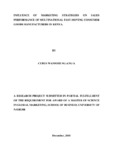| dc.description.abstract | Reports from the FMCG sector shows that multinationals dominate in sales volume and market share leadership irrespective of the intense competition. Furthermore, this sector is also characterized by commoditization of products that can only be differentiated by price. Central to the planning function of an organization are marketing strategies that define the direction of the firm in respect to customer acquisition and retention. Additionally, studies demonstrate that marketing strategies have the potential to influence the conversion rates of inputs into revenues across different sectors. Sales performance is the main variable that majority of the firms use to measure their firms performance and profitability. This study sought to investigate the influence of marketing strategies on sales performance specifically targeting multinational FMCG manufacturers in Kenya. The study was anchored on the marketing mix theory put forward by McCarthy (1994) who proposes that marketing mix is a combination of resources and marketing programs that are predisposed for a managers’ use in satisfying the customers. He posits that the marketing mix involves four Ps (product, price, promotion and place) which are used by marketing practitioners in decision making and have the influence to strategically increase or decrease the profitability of a firm. This study adopted a descriptive cross-sectional census survey design. The population of the study involved all marketing managers or their equivalent from the 20 multinational FMCG manufacturers in Kenya. Data was collected using structured questionnaires that were shared electronically via email and Google forms with the respondents. Of all the questionnaires distributed by email, 17 questionnaires were comprehensively filled and returned accumulating into a response rate of 85% which was adequate for the purposes of the research objective. The raw data was later analyzed by SPSS. Data analysis used both descriptive and inferential statistics that were used to interpret the findings. The study found that there was significant relationship between marketing strategies and sales performance. 76.03% of the respondents were of the opinion that marketing strategies significantly influenced sales performance. The study further recognized that most multinational FMCG manufacturers used promotional, place and product development strategies that significantly influenced sales volume. Of the three, specific tactics revolved around distribution channels, interaction with consumers, packaging, branding and labeling scored the highest means in response reflecting that they were the most efficient in relation to improving sales volumes. It was also established that pricing strategies were the least efficient in increasing sales volumes of multinational FMCG manufacturers. Recommendations were made for further studies into e-marketing and its influence on sales volume as well as the challenges of implementation and selection of various strategies for use. Moreover, recommendations were made for the government to reduce levies on advertising and energy costs while enacting stringent laws on copyrights so as to enable manufacturing firms to better differentiate their products and improve their profitability. For marketers recommendations were made for local firms to embrace the top three strategies of promotion, product development and place to be able to compete internationally. Besides marketers were also advised to try to implement all the strategies consistently to best position their products and better realize their profitability | en_US |



